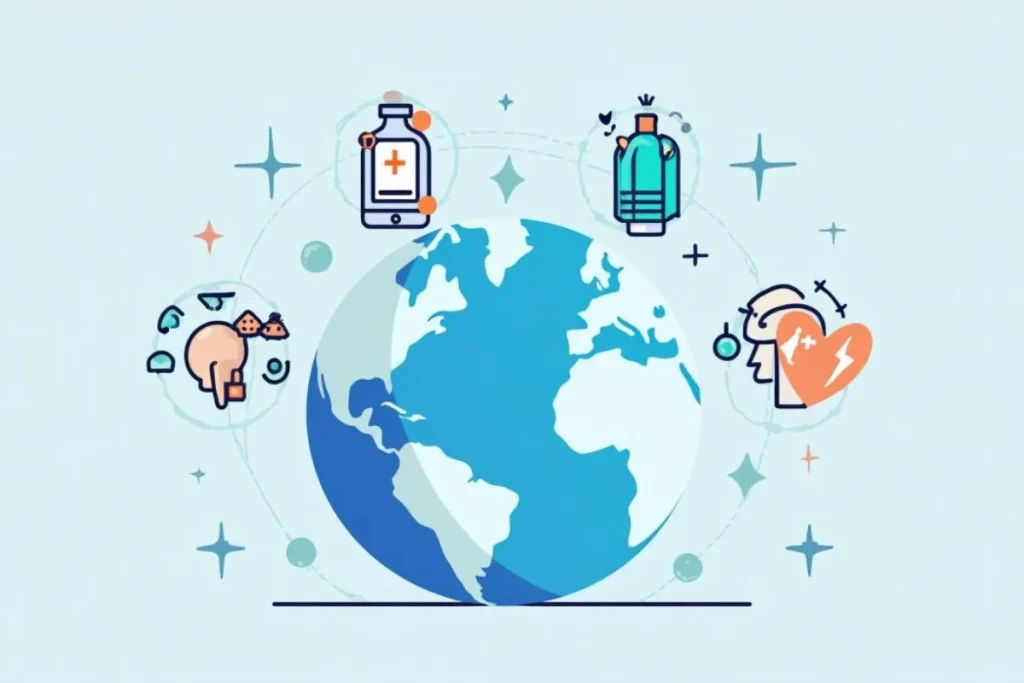Gene Therapy Transforming Rare Disease Treatment
One of the most exciting medical breakthroughs of 2025 is the advancement in gene therapy. Researchers are leveraging CRISPR and other cutting-edge tools to correct genetic mutations that cause rare diseases. This revolutionary approach offers hope to millions worldwide.
Conditions once considered incurable, such as muscular dystrophy and sickle cell anemia, are now being targeted with precision treatments. These innovations are not only saving lives but also paving the way for a healthier future.
Artificial Intelligence in Diagnostics
Artificial intelligence (AI) continues to revolutionize healthcare, with significant advancements in diagnostics being a standout achievement of 2025. AI-powered tools are enhancing the accuracy and speed of disease detection, from cancer to cardiovascular conditions.
These systems analyze medical data, including imaging and genetic profiles, to provide precise results. This efficiency allows healthcare professionals to focus on delivering better patient care and improving overall outcomes.
Personalized Medicine Becoming Mainstream
The concept of personalized medicine has taken center stage as one of the major medical breakthroughs of the year. Tailored treatments based on an individual’s genetic makeup, lifestyle, and environment are now widely accessible.
Advances in biotechnology and data analytics enable the creation of customized drugs and therapies. This approach ensures maximum effectiveness and minimal side effects, ushering in a new era of patient-centric care.
Revolutionizing Vaccines with mRNA Technology
Building on the success of mRNA COVID-19 vaccines, 2025 has seen this technology expand to tackle other infectious diseases and even cancer. mRNA-based vaccines are faster to develop and more adaptable to evolving pathogens.
These innovations are not only enhancing global health security but also inspiring hope for combating chronic diseases. The potential of mRNA vaccines is reshaping the way we think about immunization.

Advancements in Cancer Treatment
Cancer research has reached new heights, with innovative therapies offering more effective and less invasive options for patients. Immunotherapies, which harness the body’s immune system to fight cancer, are at the forefront of these breakthroughs.
Additionally, targeted therapies and early detection techniques are improving survival rates. These advancements are transforming cancer from a terminal illness into a manageable condition for many patients.
Wearable Devices Monitoring Health in Real Time
The integration of wearable technology into healthcare has been one of the most practical medical breakthroughs of 2025. Smartwatches and other devices now monitor vital signs, detect irregularities, and alert users to potential health risks.
These tools empower individuals to take control of their health and seek timely medical attention when needed. They also enhance remote patient monitoring, making healthcare more accessible and proactive.
Robotic Surgery Enhancing Precision
Robotic-assisted surgeries are becoming the standard in operating rooms, thanks to technological advancements in 2025. These systems enable surgeons to perform procedures with unparalleled precision and minimal invasiveness.
Patients benefit from shorter recovery times and reduced complications. Robotic surgery is proving especially valuable in complex procedures, such as neurosurgery and organ transplants, offering a glimpse into the future of medicine.
Advances in Mental Health Treatments
Mental health has gained unprecedented attention in 2025, with breakthroughs in both therapy and medication. New drugs are targeting conditions like depression and anxiety with greater specificity, reducing side effects and improving efficacy.
In addition, digital tools such as mental health apps and AI-powered chatbots are providing accessible support. These developments are reshaping mental health care, making it more inclusive and effective.

Regenerative Medicine and Tissue Engineering
Regenerative medicine has made significant strides, with tissue engineering emerging as a key innovation in medical breakthroughs. Scientists are now able to grow organs and tissues in the lab, addressing the global organ shortage crisis.
This technology has the potential to save countless lives and improve quality of life for patients suffering from chronic conditions. Regenerative medicine is pushing the boundaries of what is possible in healthcare, offering new hope for the future.
Global Collaboration in Medical Research
One of the unsung heroes of medical breakthroughs in 2025 is the rise of global collaboration. Researchers across borders are sharing data, resources, and expertise to tackle some of the world’s most pressing health challenges.
This approach has accelerated the pace of innovation, particularly in areas like vaccine development and rare disease research. It underscores the importance of unity in advancing medical science.
Conclusion
The year 2025 marks a transformative period in medical history, with breakthroughs that are revolutionizing healthcare. From gene therapy and AI diagnostics to regenerative medicine and wearable tech, these innovations promise a healthier and more sustainable future. Staying informed about these developments is crucial to understanding the rapid progress shaping global health.
Frequently Asked Questions
- What are the biggest medical breakthroughs in 2025?
- Major breakthroughs include advancements in gene therapy, AI diagnostics, mRNA vaccines, regenerative medicine, and wearable tech.
- How has gene therapy advanced in 2025?
- Gene therapy now offers precise treatments for rare diseases, correcting genetic mutations and providing hope for previously untreatable conditions.
- What role does AI play in healthcare breakthroughs?
- AI improves diagnostics, personalizes treatments, and enhances efficiency in patient care, transforming healthcare delivery globally.
- What is new in cancer treatment in 2025?
- Innovations include immunotherapies, targeted treatments, and advanced early detection techniques that improve survival rates.
- How are wearable devices impacting healthcare?
- Wearable tech monitors vital signs in real time, detects irregularities, and empowers individuals to manage their health proactively.
- What progress has been made with mRNA technology?
- mRNA vaccines now address diseases beyond COVID-19, including cancer and other infectious diseases, with faster development and adaptability.
- What is the potential of regenerative medicine?
- Regenerative medicine is enabling the growth of organs and tissues in labs, offering solutions to organ shortages and chronic diseases.
- How is mental health care evolving in 2025?
- Advances include targeted medications with fewer side effects and digital tools like AI-powered mental health apps for accessible support.
- How has global collaboration influenced medical breakthroughs?
- Global collaboration accelerates research and innovation by pooling resources, data, and expertise across borders for faster progress.
- What is the future of robotic surgery?
- Robotic-assisted surgeries are becoming the standard for precision, offering minimally invasive procedures with faster recovery times.



